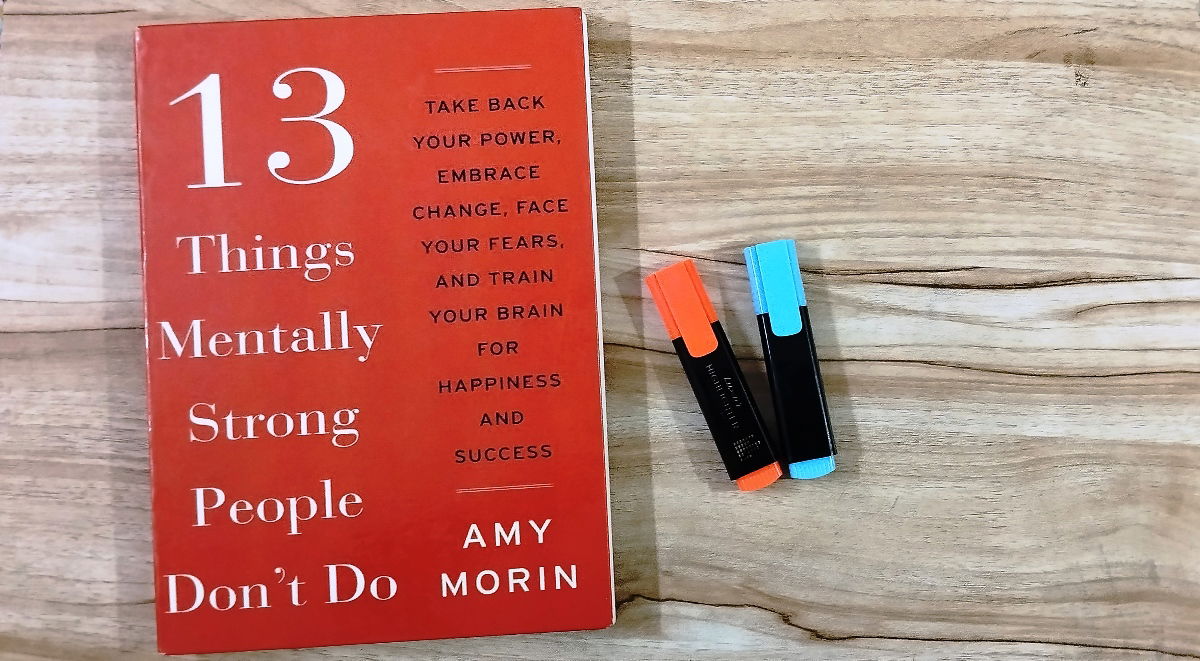Amy Morin, a psychotherapist and author, developed the 13 Things Mentally Strong People Don’t Do to avoid building mental strength and resilience.
Mental strength is essential for overall well-being because it helps people face life’s challenges with confidence and strength. It helps to manage stress better, overcome obstacles, and achieve their goals.
Avoiding these negative behavior patterns can help people develop a more optimistic and resilient outlook, better handle stress, and achieve their objectives.
Mental strength is associated with better emotional health, improved relationships, and increased job satisfaction.

- CHAPTER WISE BOOK SUMMARY
- THE BASICS OF MENTAL STRENGTH
- CHAPTER 1: THEY DON’T WASTE TIME FEELING SORRY FOR THEMSELVES
- Exchange Self-Pity For Gratitude
- CHAPTER 2: THEY DON’T GIVE AWAY THEIR POWER
- CHAPTER 3: THEY DON’T SHY AWAY FROM CHANGE
- CHAPTER 4: THEY DON’T FOCUS ON THINGS THEY CAN’T CONTROL
- CHAPTER 5: THEY DON’T WORRY ABOUT PLEASING EVERYONE
- CHAPTER 6: THEY DON’T FEAR TAKING CALCULATED RISKS
- Why We Avoid Risk
- CHAPTER 7: THEY DON’T DWELL ON THE PAST
- The problem with dwelling on the past
- CHAPTER 8: THEY DON’T MAKE THE SAME MISTAKES OVER AND OVER
- CHAPTER 9: THEY DON’T RESENT OTHER PEOPLE’S SUCCESS
- CHAPTER 10: THEY DON’T GIVE UP AFTER THE FIRST FAILURE
- CHAPTER 11: THEY DON’T FEAR ALONE TIME
- CHAPTER 12: THEY DON’T FEEL THE WORLD OWES THEM ANYTHING
- CHAPTER 13: THEY DON’T EXPECT IMMEDIATE RESULTS
- Takeaway
CHAPTER WISE BOOK SUMMARY
13 Things Mentally Strong People Don’t Do: tips and strategies for developing mental toughness by avoiding everyday negative habits and thoughts.
Amy says that bad habits are like heavy weights that you carry around with you as you go about your day. They’ll make you tired, slow you down, and frustrate you.
You struggle to reach your full potential despite your talent and hard work.
Throughout each chapter, Amy Morin encourages readers to take responsibility for their emotions and actions and to focus on solutions instead of dwelling on problems.
THE BASICS OF MENTAL STRENGTH
To understand mental strength, you must learn how your thoughts, feelings, and behaviours are intertwined.
Mental strength development requires a three-pronged approach.
- Thoughts — Identify irrational thoughts and replace them with more realistic thoughts.
- Behaviors — Behaving positively despite the circumstances.
- Emotions — Controlling your emotions so your emotions don’t control you.
You have heard the phrase “Think positive” many times. However, optimism alone is insufficient to help you reach your full potential.
Choose behaviour based on rational thinking and balanced emotions. You make your best decisions when you balance your emotions with rational thinking.
CHAPTER 1: THEY DON’T WASTE TIME FEELING SORRY FOR THEMSELVES
Self-pity is easily the most destructive of the non-pharmaceutical narcotics, it is addictive, gives momentary pleasure and separates the victim from reality.
JOHN GARDNER
We all go through pain and sorrow in life, and sadness is a normal, healthy emotion. It is a part of life.
Feeling sorry for yourself is self-destructive. It can lead to new issues and cause serious problems. Indulging in self-pity hinders living a full life in the following ways:
- Feeling sorry for yourself takes a lot of energy and does nothing to change the situation. It’s a waste of time.
- It leads to more negative emotions, such as anger, loneliness, resentment, and other feelings, and fuels more negative thoughts.
- If you tend to believe that your problems are worse than anyone else’s.
- Feeling sorry for yourself can make you miserable, but it can also become a self-fulfilling prophecy.
- Self-pity gets in the way of dealing with grief, sadness, and anger and prevents you from dealing with other emotions.
- If five good things and one bad thing happen daily, self-pity will cause you to focus only on the negative.
- A victim mentality is not an attractive characteristic. It interferes with relationships.
Exchange Self-Pity For Gratitude
- Giving up self-pity will make you stronger. Gratitude impacts your psychological and physical health.
- People who feel gratitude don’t get sick as often as others. They have better immune systems and report fewer aches and pain.
- Gratitude leads to more positive emotions, and more grateful people experience more happiness, joy, and pleasure daily.
- Gratitude improves social life.
Focus on what you have instead of what you don’t. Practising gratitude every day will fill your life with positivity.
It really works great. It’s my personal experience. I teach my children to show gratitude for whatever they have in their lives. It creates healthy boundaries in the family and values of people and things.
A real-life example is Helen Keller, who was deaf and blind in childhood but overcame immense challenges to become an author, activist, and lecturer.
Instead of dwelling on her disabilities, she focused on her education and advocacy.

CHAPTER 2: THEY DON’T GIVE AWAY THEIR POWER
When we hate our enemies, we are giving them power over us: power over our sleep, our appetites, our blood pressure, our health, and our happiness.
DALE CARNEGIE
Do you have any points that sound familiar? How do other people have the power to control your thinking, feelings, and behaviour?
- Other people can make you feel so angry that you say and do things you later regret.
- You have changed your goals based on what others have told you that you should be doing with your life.
- The type of day you will have depends on how other people behave.
- Regardless of the source, any criticism or negative feedback you receive makes you feel deeply offended.
- You often complain about what you “have to” do in life.
- You spend a lot of time complaining about people and circumstances that you don’t like.
- You hold a grudge when someone offends you and hurts you.
Can you see yourself in any of the above examples? Then, you can confidently retain your power despite the people and circumstances around you.
Think before you react. Take a deep breath, excuse yourself from the situation, and distract yourself.

CHAPTER 3: THEY DON’T SHY AWAY FROM CHANGE
It’s not that some people have willpower and some don’t. It’s that some people are ready to change and others are not.
JAMES GORDON
Why Do We Shy Away From Change?
People tend to avoid change because they think it’s too risky or uncomfortable. New Year’s resolutions are commonly broken because we try to make changes based on a date, not because we are ready. If you are not ready to make changes, you will likely fail to maintain them. There are five stages of change.
- Precontemplation— When people are precontemplative, they don’t yet identify any need to change.
- Contemplation — Actively contemplative People are thinking about the pros and cons of changing.
- Preparation —This is the stage where people prepare to make a change.
- Action — Here, concrete behavioural change takes place.
- Maintenance — This often overlooked step is essential.
Some issues with avoiding changes are listed below.
- Staying the same often equals getting stuck in a rut. Life will be boring if you do not do anything new.
- You won’t learn new things. The world will change with and without you.
- You won’t challenge yourself to develop healthier habits. It’s easy to develop bad habits, but breaking bad habits requires a willingness.
- Your life may not get better. If you do not change, you will not improve your life.
- The longer you wait, the harder it gets. If you have a bad habit like smoking. It will be harder to break.
For Example, Monika is a 35-year-old marketing manager who is stuck in a life that no longer excites her.
Every day felt the same: wake up, work, come home, repeat. She knew something needed to change, but fear held her back.
It is very important to take breaks to rejuvenate and return to your work with fresh energy.
CHAPTER 4: THEY DON’T FOCUS ON THINGS THEY CAN’T CONTROL
You may not control all the events that happen to you, but you can decide not to be reduced by them.
MAYA ANGELOU
A person should try to get a balanced sense of control over his or her life. Influence people without trying to control them, and focus on what you can control. As per Amy Morin, you can’t control all things in your life; she has given a few examples :
- You can host a good party, but you can’t control whether people have fun.
- You can give your child the tools to be successful, but you can’t make your child a good student.
- Likewise, you can do your best at your job but can’t force your boss to recognize your work.
- You can sell a great product but can’t dictate who buys it.
- You may be the most intelligent person in the room, but you can’t make people do what you want.
- You can nag, beg, and make threats, but you can’t force your spouse to behave differently.
- You can have the most positive attitude in the world, but it can’t make a terminal diagnosis disappear.
- You can control how much you care for yourself, but you can’t always prevent illness.
- You can control what you’re doing but can’t control your competitor.
- You can put your heart into writing a book but can’t control whether it becomes a bestseller.
- You can encourage your friends and family to adopt a healthier lifestyle but can’t force them to eat better or exercise.
Influence people without trying to control them. Amy provides a few methods for that.
- Listen First, speak second.
- Share your opinions and concerns, but only share them once.
- Change your behaviour.
- Point out the positivity.
This book helps me a lot in real life because it gives me motivation and strength whenever I face trouble. It’s an excellent book. I, personally, have read it many times; it’s like a friend to me.

CHAPTER 5: THEY DON’T WORRY ABOUT PLEASING EVERYONE
Care about what other people think and you will always be their prisoner.
LAOTZU
Amy discusses how worrying about trying to please everyone wastes time.
For example, Megan always tries to meet other people’s needs. How others perceive her fuels her self-worth.
She went to such great lengths to avoid conflict, feeling rejected or losing relationships.
It was much worse than the emotional and physical fatigue she felt.
- It’s okay for other people to feel angry or disappointed.
- People pleasers are easily manipulated. People pleasers can be spotted a mile away.
- You can’t please everyone. Everyone can’t be delighted by the same things.
- Take time to decide whether to say Yes or No
Saying no when you don’t want to do something. Identify your values and behave according to them. These shared values are :
- Children
- Romantic relationship
- Extended family
- Religious/Spiritual beliefs
- Volunteering or helping other people
- Career
- Money
- Maintaining good friendships
- Taking care of your physical health
- Having a sense of purpose
- Leisure activities
- Education
CHAPTER 6: THEY DON’T FEAR TAKING CALCULATED RISKS
Don’t be too timid and squeamish about your actions. All life is an experiment. The more experiments you make the better.
RALPH WALDO EMERSON
You face many risks in your life, including financial, physical, emotional, social, and business risks. People often avoid taking risks that could help them reach their full potential because they are afraid.
Do you respond positively to any of the questions below?
- You struggle to make important decisions in your life.
- You spend a lot of time daydreaming about what you would like to do, but you don’t take any action.
- Sometimes, you decide without thinking about it because it makes you feel anxious.
Why We Avoid Risk
When a person thinks about a new business or a new job, his mind is full of negative thoughts. This is a real thing that has happened to most of us.
For Example, Dale thought about opening a new business. He was reminded of the last time he took a financial risk, and it didn’t work out for him. He imagined himself bankrupt or risking his retirement to open a business that would fail.
His negative thoughts create fear and anxiety that stop him from taking action. He also loses the chance of success.
A lack of knowledge about how to calculate risk leads to more fear. Fear of risk often leads to avoidance. You can reduce your risk-taking ability with practice.

CHAPTER 7: THEY DON’T DWELL ON THE PAST
We do not heal the past by dwelling there; we heal the past by living fully in the present.
MARIANNE WILLIAMSON
Some people focus on the past, while others focus on the present. Self-reflection is healthy, but dwelling on the past can be harmful, keeping one from enjoying the present and planning for the future. But You should not stuck in the past. You can start living today.
The problem with dwelling on the past
Thinking about the past won’t improve things, but it will take time and cause more problems in the future. Here are some ways that focusing on the past can make it harder to be your best self.
- You can’t enjoy the present if your mind is stuck in the past.
- You won’t be able to set clear goals or stay motivated.
- If you have an unresolved issue in the past, you will not be able to make a healthy decision.
- Dwelling on the past does not resolve anything.
- It leads to depression.
- Dwelling on the past is bad for your health.
Living in the past can make you more vulnerable to diseases like heart disease, cancer, dementia, and other negative events that cause inflammation in your body.
CHAPTER 8: THEY DON’T MAKE THE SAME MISTAKES OVER AND OVER
The only real mistake is the one from which we learn nothing.
JOHN POWELL
Everyone makes mistakes, even though we may think we learn from our mistakes the first time around.
Repeating the same mistake leads to many problems :
- You won’t reach your goals.
- The problem won’t get solved.
- You may not try as hard.
- You may frustrate others who watch you repeat the same mistakes.
- You may develop irrational beliefs to excuse your mistakes.
You can follow these steps to avoid repeating your mistakes.
- Set behaviour that will replace previous behaviour.
- Make a writing plan and write down what you are doing wrong.
- Identify warning signs that you are headed down the wrong path again.
- Find a way to hold yourself accountable.
- Practise self-discipline strategies
When you acknowledge your personal responsibility for each mistake, you will be able to correct it quickly. Learning from your mistakes will make you stronger.

CHAPTER 9: THEY DON’T RESENT OTHER PEOPLE’S SUCCESS
Resentment is like drinking poison and then hoping it will kill your enemies.
NELSON MANDELA
Mentally strong people don’t view success as a finite resource. They know that just because someone else is flourishing doesn’t mean they can’t also be flourishing.
Mentally strong people are happy when others succeed, and they may even use this to reach their own goals. On the other hand, people who struggle with resentment often view prosperity as a limited resource. This mindset can lead to negative emotions such as bitterness, anger, and frustration.
These strategies can help you change your thoughts if you resent others.
- Avoid comparing yourself to others.
- Develop an awareness of your stereotypes.
- Stops emphasizing your weakness.
- Quit Magnifying other people’s strengths.
- Don’t insult other people’s accomplishments.
- Stop trying to determine what’s fair.
She says to focus on your accomplishments and remember that someone else’s success doesn’t make you less successful.
Read More: Make Your Bed Summary (William H. McRaven)
CHAPTER 10: THEY DON’T GIVE UP AFTER THE FIRST FAILURE
Failure is part of the process of success. People who avoid failure also avoid success.
ROBERT T. KIYOSAKI
Morin explains that mentally strong people see failure as a learning opportunity rather than a sign of their worth.
They understand that failure is a natural part of the learning process and that it can help them grow and improve.
Most successful people view failure as the beginning of a long journey to success.
They may feel discouraged and give up on their goals. Morin provides tips on developing resilience and overcoming the fear of failure.
- Viewing failure as a learning.
- Facing fear of failure.
- Develop a new plan to increase your chance of success
- Focus on elevating your skills rather than displaying them.

Know More: 10 Timeless Lessons From The Book Rich Dad Poor Dad
CHAPTER 11: THEY DON’T FEAR ALONE TIME
All man’s miseries derive from not being able to sit quietly in a room alone.
BLAISE PASCAL
Mentally strong people are comfortable being alone and see it as an opportunity for self-reflection and personal growth.
They use their alone time to recharge, reflect on their thoughts and feelings, and focus on their goals.
Morin provides tips on embracing alone time and making the most of it. She suggests using alone time to do the following.
- Take a few minutes daily to think about your personal or professional goals.
- Pay attention to your feelings. Check yourself emotionally and physically, and think about your stress level.
- The first step to creating your life type is deciding how you want the future to look. Set a goal for the future.
- Writing in a journal can be a powerful tool for understanding and learning from your emotions.
Constant communication interferes with your daily activities and can lead to increased stress and anxiety. Take a break and spend some time alone.
Turn off social media or the TV. Ride a car without the radio playing. Go for a walk without your cell phone. Starting with short periods of alone time and gradually increasing the duration.
CHAPTER 12: THEY DON’T FEEL THE WORLD OWES THEM ANYTHING
Don’t go around saying the world owes you a living. The world owes you nothing. It was here first.
ROBERT JONES BURDETTE
Why do we feel the world owes us something?
Amy’s studies found that the younger generation has an increased desire for material wealth and a decreased desire to work. She suggests several reasons for this disconnect, including:
- The focus on helping kids feel good about themselves is too much. School programs aimed at improving self-esteem.
- Overindulgent parenting prevents children from learning how to accept responsibility for their behaviour. When kids are given whatever they want, they do not value food, clothes, or other things.
- Social media fuels mistaken beliefs about self-importance. Young people cannot imagine a world without selfies and self-promotional blogs. Develop a healthy amount of self-esteem.
Behave like a team player. If you want to create a genuine friendship or improve a romantic relationship, you won’t be able to do so unless you are a team player. Practicing humility makes you stronger. Think about the other feelings, and focus on what you have to give instead of what you wish to take.

CHAPTER 13: THEY DON’T EXPECT IMMEDIATE RESULTS
Patience, persistence and perspiration make an unbeatable combination for success.
NAPOLEON HILL
Morin discusses the importance of patience and perseverance in achieving long-term goals. Although mentally strong people may not see immediate results, they are willing to invest the necessary time and effort to achieve their goals.
- In the era of technology, we lack patience. We want immediate results. For example, people start leaving the website if an online video is not uploaded within two seconds.
- We overestimate our abilities.
- We underestimate how long change takes.
Some people give up when they don’t see immediate results. They may be focused on short-term gains and lack the patience or perseverance to achieve long-term success.
Know More: How To Effectively Read Self Help Books For Lasting Change
Takeaway
Amy Morin provides valuable insights and practical advice on developing mental strength and resilience.
The importance of taking responsibility for one’s own life is emphasized in the book, from avoiding self-pity to embracing change.
Building healthy habits that promote success and personal growth.
People can overcome challenges, reach their goals, and live happy lives with mental strength and healthy habits.
